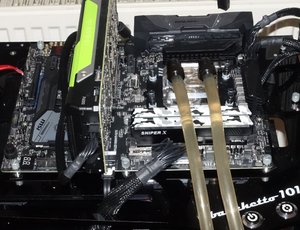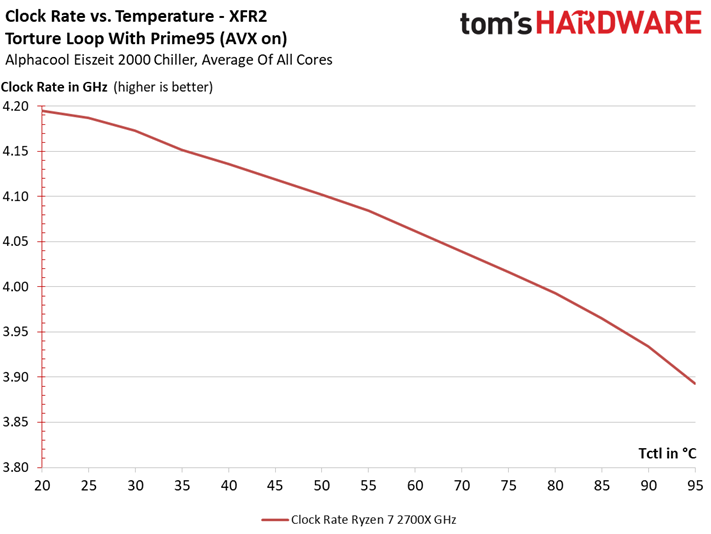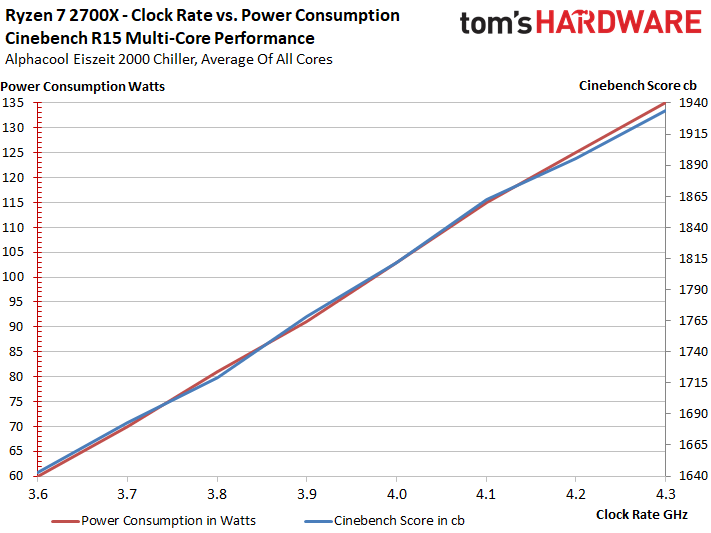AMD Ryzen 7 2700X Review: Redefining Ryzen
Why you can trust Tom's Hardware
XFR2 vs. Manual Overclocking
XFR2, Cooling, and Clock Rates
In contrast to the first-gen Ryzen models and their strange temperature curves, the tCTL (core temperature) values now correspond with what we'd expect to see. AMD does add a 10-degree offset to the 2700X specifically, which motherboard BIOSes already take into account. We subtract this offset from our own measurements.


Chip quality naturally influences achievable clock rates as well. These effects are seen much more clearly with second-gen Ryzen CPUs supporting XFR2, since they have to be binned precisely.
With as much cooling performance as we could muster, Ryzen 7 2700X still reaches almost 4.2 GHz. A more conventional thermal solution would result in a lower clock rate. However, with a good air cooler, it should be possible to sustain 4 GHz on all cores.
Manual Overclocking
Ryzen 7 2700X can be manually overclocked to 4.3 GHz. But the 1.475V required for this is more aggressive than we want to get long-term. Pushing to 4.35 GHz resulted in a crash no matter how much voltage we applied.
As the following curve shows, power consumption and performance in Cinebench are almost directly proportional, so long as the system runs stably and doesn't crash. It's also worth noting that Cool'n'Quiet is completely disabled on our test platform when we configure the ratio multiplier manually. When that happens, the configured clock rate doesn't drop from its specified maximum, even at idle.
We measure a maximum of 135W in Cinebench and just over 150W in Prime95 with AVX, although this extreme torture test is more of an exhibition.
If you spend some money on good cooling, there's no reason to manually overclock Ryzen 7 2700X. Thanks to XFR2, AMD's flagship should remain stable above 4 GHz, even under full load. Try to go any higher and you'll pay a hefty price in heat, power, and possibly long-term reliability.
Get Tom's Hardware's best news and in-depth reviews, straight to your inbox.
MORE: Best CPUs
MORE: Intel & AMD Processor Hierarchy
MORE: All CPUs Content
Current page: XFR2 vs. Manual Overclocking
Prev Page Rendering, Encoding, And Compression Next Page Power Consumption
Paul Alcorn is the Editor-in-Chief for Tom's Hardware US. He also writes news and reviews on CPUs, storage, and enterprise hardware.
-
Ninjawithagun Once again, Tom's provides an incorrect comparison in this review. Intel's 8700K is comparable to the 2600 or 2600X and NOT the 2700 or 2700X. Just count the number of cores and threads and one should be able to figure that out O.oReply
Whine all you want. Just because you down vote me only means you don't know how to read or count :P -
Sakkura Reply20899022 said:Once again, Tom's provides an incorrect comparison in this review. Intel's 8700K is comparable to the 2600 or 2600X and NOT the 2700 or 2700X. Just count the number of cores and threads and one should be able to figure that out O.o
The 2700X costs $329, the 8700K costs $359. It is a very reasonable comparison to make. -
justin.m.beauvais It sure is nice to see an AMD chip up there in the thick of it with Intel's best offerings. Competition has finally officially returned. I'm impressed that AMD gained so much ground and managed to make the price more competitive than the 1800x was. It is slightly disappointing that overclocking remains less impressive than the Intel offerings, but everything else sort of makes up for that.Reply
I didn't feel like AMD was quite "there" yet with the 1000 Ryzens, but with the 2000 series I feel like we can finally say that they have arrived. -
Ninjawithagun Reply20899035 said:20899022 said:Once again, Tom's provides an incorrect comparison in this review. Intel's 8700K is comparable to the 2600 or 2600X and NOT the 2700 or 2700X. Just count the number of cores and threads and one should be able to figure that out O.o
The 2700X costs $329, the 8700K costs $359. It is a very reasonable comparison to make.
Incorrect. It has nothing to do with price. Comparing like CPU architectures is the only logical course of action. 6 core/12 thread vs 8 core/16 thread makes no sense. Comparing the Intel 8700K 6 core/12 thread @ $347 to the AMD 2600X 6 core/12 thread @ $229.99 makes the most sense here. Once the proper math is done, AMD destroys Intel in performance vs. cost, especially when you game at any resolution higher than 1080P. The GPU becomes the bottleneck at that point, negating any IPC benefits of the Intel CPUs. I know this how? Simple. I also own a 8700K gaming PC ;-)
Once again, whine all you want. Just because you down vote me only means you don't know how to read or count :P -
bfwhsm Now, do the tests again with meltdown/spectre applied on intel cpus, as you should.Reply
And you will see a VERY different story, with 2700k destroying 8700k in almost every measure).
(check out anandtech's review to get an idea) -
Ninjawithagun Reply20899131 said:Now, do the tests again with meltdown/spectre applied on intel cpus, as you should.
And you will see a VERY different story, with 2700k destroying 8700k in almost every measure).
(check out anandtech's review to get an idea)
I will definitely check out that review as well. Thanks bfwhsm! -
tripleX Reply20899131 said:Now, do the tests again with meltdown/spectre applied on intel cpus, as you should.
And you will see a VERY different story, with 2700k destroying 8700k in almost every measure).
(check out anandtech's review to get an idea)
Maybe you should read the comments on the AnandTech article. They all point out that the test results don't match any other site's results. -
Sakkura Reply20899157 said:20899131 said:Now, do the tests again with meltdown/spectre applied on intel cpus, as you should.
And you will see a VERY different story, with 2700k destroying 8700k in almost every measure).
(check out anandtech's review to get an idea)
Maybe you should read the comments on the AnandTech article. They all point out that the test results don't match any other site's results.
... because of the different testing procedure that he just referred to.

